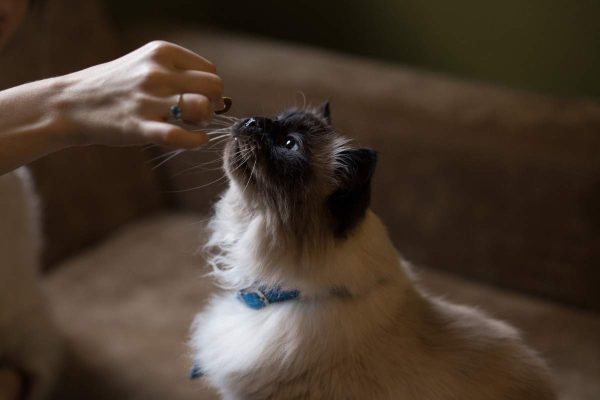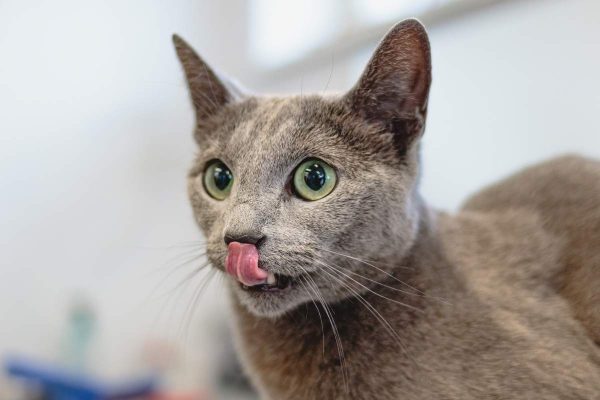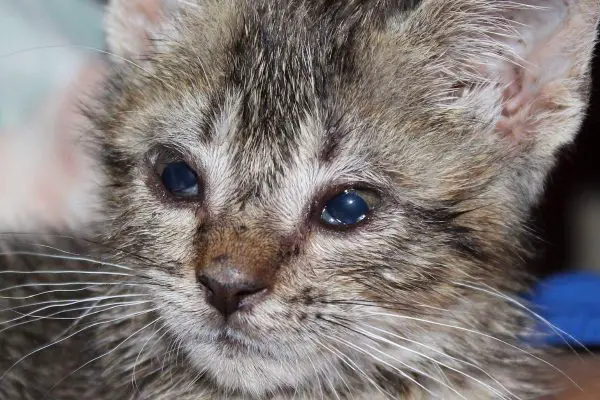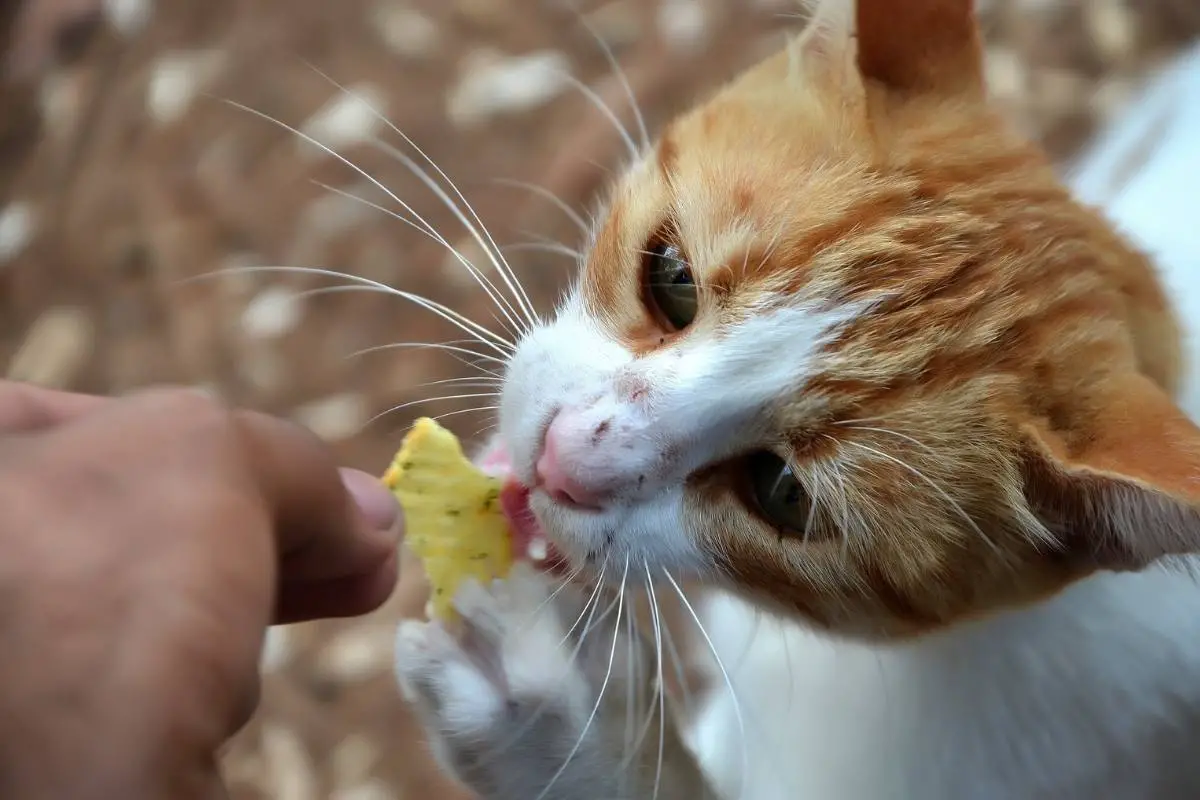Feeding your cat from your hand may feel like an important part of bonding with your beloved pet, whether you are handing out special treats or just parts of a daily meal. However, your growing cat may suddenly no longer be interested in taking food from your hand or, in adult cats, they have never been interested in it from the beginning.
So, why won’t my cat take food from my hand? The most straightforward answer is that your cat is assuming that since you are holding the food, it is your food, and they don’t want to take it from you. However, there may be other underlying issues that cause their reluctance, such as infections, pain, or nausea.
In the following sections, you can learn more about your cat’s behavior, as well as straightforward and more complex causes for their reluctance to eat.
Why Won’t My Cat Eat Out of My Hand?
A cat’s reluctance to eat out of your hand can be attributed to several factors. One common reason is the cat’s natural instinct to associate hand proximity with potential competition for food. Cats are solitary hunters by nature, and the hand reaching towards them may trigger a defensive response. Additionally, changes in behavior may arise as cats mature from kittens to adults, becoming less inclined to indulge in playful behaviors like hand-feeding.
Sudden and persistent changes in a cat’s refusal to eat from your hand, however, may indicate underlying health issues such as dental problems, pain, or nausea. It is essential to observe for any recent changes in the cat’s environment, smells, or behavior that could be causing discomfort.
Maturity and Changing Behavior
Kittens:

Most cats when they are kittens are more than happy to take food from you—treats and snacks are often their favorite part of their day. To you, this may seem like a simple activity of you demonstrating your affection to your furry friend, but to the kitten, they are willing to take food from you because they are ultimately young animals who cannot hunt on their own, and so they are dependent on their mother for food. They see you as their mother, and so you bringing them food is a completely normal part of their lives.
Growing Up
As your cat grows from an adorable ball of fluff into an adult, their instincts will tell them that they are now capable of hunting for their own food, and that they are no longer dependent on their mother, or you, for bringing them food.
Because of this, when you present them with a treat now, they might be confused. In their mind, they no longer need their meals brought to them, and they find it strange that you are still supplying them with food when they are able to do it for themselves.
Reason and Instinct
This simple sign of maturity might be behind your cat’s reluctance to eat from your hand, especially if your cat has gradually developed this lack of interest in taking food from you. When they see you holding a treat or a snack, they assume that since you are holding it, it belongs to you.
Your cat won’t take it from you because they respect you, and don’t want to steal your food. Alternatively, if your cat recognizes that the food might be for them but still doesn’t want to cross a line and attempt ‘take’ your food, your pet may now demand that you put the food on the floor. When you put it down, they recognize that you don’t want it, and so they are more than happy to eat it.
Encouragement and Teaching
You may miss hand-feeding your cat. It can be an important part of your routine to give your cat a treat in the morning or evening, or even as part of training. If this is the case, there are ways you can encourage your cat to be willing to take treats directly from you again.
Be patient and demonstrate that you are not going to take the treat away from them. Hold the treat out on your flat hand for a time, then carefully place it on the floor. Your cat will eventually realize that you are not going to eat the treat yourself or snatch it away from them and will become comfortable taking it from your hand again, even as a full-grown cat.
Other Reasons for Reluctance to Eat
Sniffing Out the Cause

If your cat has only recently started refusing to take food from you and the issue has not developed over time, there could be something else causing the problem. It could be something as simple as a new smell.
Cats have remarkably sensitive noses. If you’re using a new hand lotion or soap, particularly one scented with citrus or mint, your cat may be reluctant to approach you.
If your cat is also avoiding your hand as you reach out to stroke them, or now sneezes, wrinkles their nose, or makes a funny face when you offer your hand, your soap or lotion may be to blame for their refusal to eat from your hand.
Cat Repellent
If you don’t wear perfume, ask yourself if you were recently in contact with a plant known to repel cats, like marigold, rosemary, or lavender. These flowers and herbs are very strongly scented, and though we may enjoy the smell, cats definitely do not.
If you are not a gardener and don’t have these plants around you, think of the last time you used hand sanitizer or something similar. If it was directly before reaching out to pet your cat or offer them a treat, the fumes from the alcohol may be to blame. The smell of rubbing alcohol can be just as strong and unpleasant for your kitty as it is for you.
An Easy Fix:
Resolving whether or not something you have had contact with is a cat repellant can be a remarkably quick fix to your cat refusing to take treats from you. Run through the list of things you’ve either touched or applied to your hands.
Once you’re sure that your new perfume is not too strong, your herb garden is not to blame, and that the fumes from your hand sanitizer have dissipated, try feeding your cat again. You may be surprised to find that it was as simple as just washing your hands with a milder soap!
Health Concerns
When You Should Worry

If a simple answer is not resolving the issue, there could be a health problem. Observe your cat closely to see if there is any obvious decrease in appetite: are they just refusing to eat from you, or are they disinterested in food altogether?
Refusal to eat at all, attempts to eat and then sudden refusal, or seeming to be hungry—demanding to be fed, licking lips, meowing eagerly—followed by them only nibbling or licking their meal, are all signs of a cat who may be in distress.
Signs of Nausea and Discomfort
Nausea appears in cats just like it does in humans. You may feel sick to your stomach and not want to eat, but you don’t look obviously sick, or throw up. Likewise, cats can have stomach aches and nausea but not clearly show it. Your cat cannot tell you exactly how they’re feeling, whether they’re in pain or sick, so it is important to look for signs such as:
- Loss of appetite mid-meal
- Increased lip-smacking
- Increased desire to ‘bury’ or ‘hide’ their meals
- Retching with no product or producing yellowish bile
- Obvious restlessness
All of these are indicative of an unhappy cat. In addition to this, be sure to recall if your cat has had any strange falls or other accidents recently. If you’ve seen your cat limping, or noticed they seem unhappy or in pain when you pick them up, your pet may have a bruise, or sprain, or worse, a broken bone.
Pain from leaning down to eat or from chewing could be acting as a deterrent to your cat eating.
Injuries, Infections, Aches and Pains
If you notice any of these signs of discomfort in your cat, it is important to take your pet to the vet as soon as possible for a professional assessment. Your cat could have serious issues like cancer or organ failure, particularly if it is a much older animal.
However, it is more likely that it is something simpler and more easily treated like an oral abscess or other dental issue, a bladder or urinary tract infection, body pain from bruise or injury, or an irritated GI tract from constipation or a bad reaction to something else your cat ate. Even felines have food sensitivities and allergies, and these are important to be aware of.
Regardless, you should bring your beloved pet to a doctor to receive the appropriate diagnosis and treatment.
Conclusion
Your cat losing interest in taking treats directly from your hand is often a normal part of your pet growing up and becoming a mature adult. It may seem odd to you, but it is a sign of your kitten becoming a cat and is nothing to be worried about. However, if this difference in your cat’s behavior is a very recent and abrupt change, there could be something else affecting your pet.
Before you panic, be sure to analyze your own behavior and sniff for new smells that could be bothering your cat—it could be that your new perfume is the culprit. Once this has been ruled out, it’s possible there is something more significant at play.
Aches and pains from new or old injuries, nausea from either infections, impactions, or food sensitivities, or serious illnesses like cancer or organ damage could be to blame. If you have tried to adjust for the simple causes without success, it’s best to get your cat to a vet so they can treat your beloved feline and get things back to normal.
With your help, and help from your veterinarian, it is likely you will be back on track with your cat very soon!

